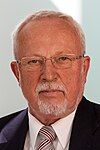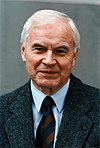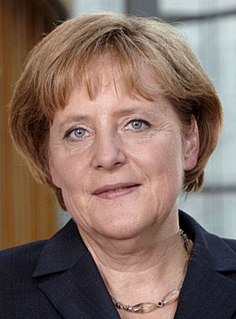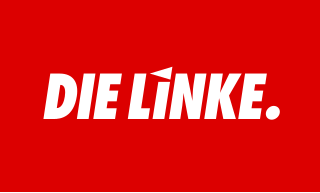| |||||||||||||||||||||||||
All 400 seats in the Volkskammer 201 seats were needed for a majority | |||||||||||||||||||||||||
|---|---|---|---|---|---|---|---|---|---|---|---|---|---|---|---|---|---|---|---|---|---|---|---|---|---|
| |||||||||||||||||||||||||
 Maps showing the distribution of party votes per district. The map in the bottom right shows the largest party in each district. | |||||||||||||||||||||||||
| |||||||||||||||||||||||||
Legislative elections were held in the German Democratic Republic (East Germany) on 18 March 1990. It was the first and only free parliamentary election in the GDR, and the first truly free election held in that part of Germany since 1932. Four hundred deputies were elected to the Volkskammer.

East Germany, officially the German Democratic Republic, was a country that existed from 1949 to 1990, when the eastern portion of Germany was part of the Eastern Bloc during the Cold War. It described itself as a socialist "workers' and peasants' state", and the territory was administered and occupied by Soviet forces at the end of World War II — the Soviet Occupation Zone of the Potsdam Agreement, bounded on the east by the Oder–Neisse line. The Soviet zone surrounded West Berlin but did not include it; as a result, West Berlin remained outside the jurisdiction of the GDR.

The concept of Germany as a distinct region in central Europe can be traced to Roman commander Julius Caesar, who referred to the unconquered area east of the Rhine as Germania, thus distinguishing it from Gaul (France), which he had conquered. The victory of the Germanic tribes in the Battle of the Teutoburg Forest prevented annexation by the Roman Empire, although the Roman provinces of Germania Superior and Germania Inferior were established along the Rhine. Following the Fall of the Western Roman Empire, the Franks conquered the other West Germanic tribes. When the Frankish Empire was divided among Charles the Great's heirs in 843, the eastern part became East Francia. In 962, Otto I became the first Holy Roman Emperor of the Holy Roman Empire, the medieval German state.
The largest bloc was the Alliance for Germany, led by the East German branch of the Christian Democratic Union and running on a platform of speedy reunification with the West. The runner-up was the East German branch of the Social Democratic Party of Germany, which had been refounded only six months earlier. The former Socialist Unity Party of Germany, renamed the Party of Democratic Socialism, ran in a free election for the first time ever and finished in third place.

The Alliance for Germany was an opposition coalition in East Germany. It was formed on 5 February 1990 in Berlin to stand in the East-German Volkskammer elections. It consisted of the Christian Democratic Union, Democratic Awakening and the German Social Union. The German Forum Party was invited to join, but declined.

The Christian Democratic Union of Germany was an East German political party founded in 1945. It was part of the National Front with the Socialist Unity Party of Germany (SED) and a bloc party until 1989.

The German reunification was the process in 1990 in which the German Democratic Republic became part of the Federal Republic of Germany to form the reunited nation of Germany, and when Berlin reunited into a single city, as provided by its then Grundgesetz (constitution) Article 23. The end of the unification process is officially referred to as German unity, celebrated on 3 October. Following German reunification, Berlin was once again designated as the capital of united Germany.
The Alliance came up just short of the 201 seats needed to govern alone. [1] Lothar de Maizière of the CDU, the early favorite to become East Germany's first freely elected prime minister, invited the SPD to join his Alliance partners – Democratic Awakening (DA) and the German Social Union (DSU) – in a grand coalition. The SPD was initially cool to de Maizière's offer, in part because of the presence of the DSU in de Maizière's grouping; the SPD had originally been willing to govern alongside all parties other than the PDS and DSU. [2]
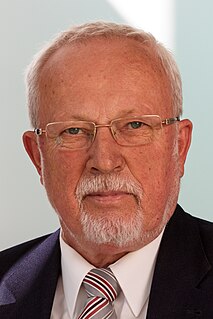
Lothar de Maizière is a German Christian Democratic politician. In 1990, he served as the only democratically elected prime minister of the German Democratic Republic, and as such was the last leader of an independent East Germany.

Democratic Awakening was an East German political movement and political party that was active during the Fall of Communism and in the period leading up to the German reunification. While it was a relatively minor party, it took part in the first democratically elected government in East Germany in 1990, and is especially known because future Chancellor of Germany Angela Merkel started her political career within the party.

The German Social Union is a small conservative political party mainly active in the new states of Germany. It was founded in 1990 as a right-wing opposition group during the Wende transition to democracy in East Germany, when it was part of the Alliance for Germany electoral coalition. In 2015 it has about 100 members.
On 5 April 1990, the new Volkskammer elected the CDU's Sabine Bergmann-Pohl as its president. As the State Council was at the same time dissolved, she became East Germany's interim head of state. Four days later, de Maizière announced that he had reached an agreement for a grand coalition consisting of the Alliance parties (the CDU, DSU and DA), the SPD, the liberal Association of Free Democrats (BFD), and one non-attached member. Between them, the three main partners in the coalition commanded a two-thirds supermajority in the Volkskammer, enough to pass amendments to the constitution. [3] [4]
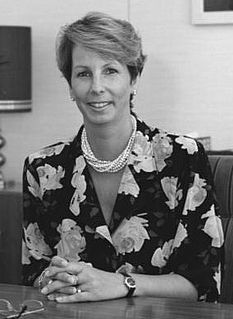
Sabine Bergmann-Pohl is a German doctor and politician. A member of the Christian Democratic Union of Germany (CDU), she was president of the People's Chamber of East Germany from April to October 1990. As such, she served as acting head of state of East Germany until its merger into West Germany in October. After the reunification of Germany, she served in the government of Chancellor Helmut Kohl.

The political leadership of East Germany was in the hands of several offices.
The Association of Free Democrats was a liberal coalition formed in East Germany on 12 February 1990. It originally consisted of the Liberal Democratic Party, the Free Democratic Party (GDR) and the German Forum Party. In the Volkskammer election of the 18 March 1990 the Association of Free Democrats polled 5.28% of the votes and gained 21 seats. It then participated in the last GDR government led by Lothar de Maizière.
On 20 September of the same year, the Volkskammer voted by a 299–80 margin to accept the unification treaty, which had earlier been approved on a 442–47 vote by the West German Bundestag, and unify its territory to become the Federal Republic of Germany, meaning that East Germany, after 40 years of independence, would cease to exist. The treaty took effect on 3 October. [5]
The Treaty on the Final Settlement with Respect to Germany, or the Two Plus Four Agreement, was negotiated in 1990 between the Federal Republic of Germany and the German Democratic Republic, and the Four Powers which occupied Germany at the end of World War II in Europe: France, the Soviet Union, the United Kingdom, and the United States. In the treaty the Four Powers renounced all rights they held in Germany, allowing a united Germany to become fully sovereign the following year.

West Germany, officially the Federal Republic of Germany, and referred to by historians as the Bonn Republic, was a country in Central Europe that existed from 1949 to 1990, when the western portion of Germany was part of the Western bloc during the Cold War. It was created during the Allied occupation of Germany in 1949 after World War II, established from eleven states formed in the three Allied zones of occupation held by the United States, the United Kingdom and France. Its capital was the city of Bonn.

The Bundestag is the German federal parliament. It can be compared to the lower house of parliament along the lines of the United States House of Representatives, the Irish Dáil Éireann or the House of Commons of the United Kingdom, with the Bundesrat, though a separate institution, having a similar role to the upper house of a bicameral parliament.
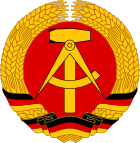 |
|---|
| This article is part of a series on the politics and government of East Germany |
